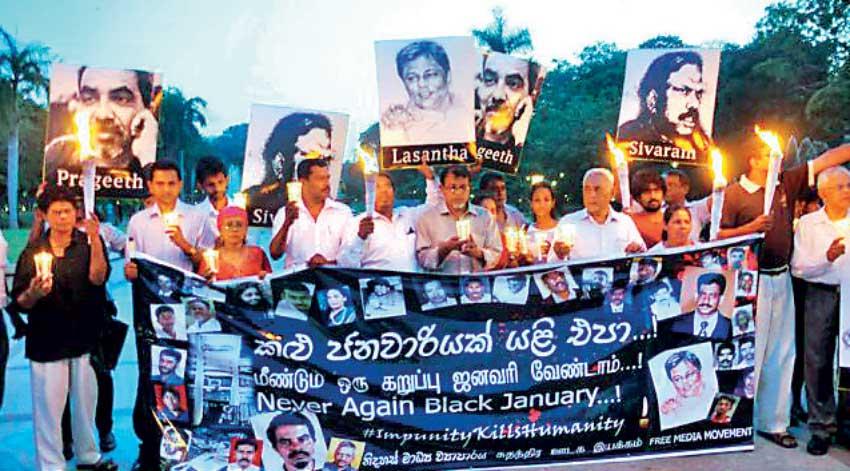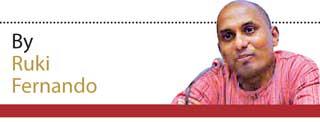Reply To:
Name - Reply Comment

Dozens of journalists have been killed, abducted, or have disappeared in the past two decades in Sri Lanka. According to the Journalists for Democracy in Sri Lanka (JDS), 44 journalists and media workers were killed or disappeared during this period. Many have been arrested and detained, assaulted, threatened, intimidated, and harassed
 “Stifling the peaceful expression of legitimate dissent today can only result, inexorably, in the catastrophic explosion of violence some other day.”
“Stifling the peaceful expression of legitimate dissent today can only result, inexorably, in the catastrophic explosion of violence some other day.”
– Justice and President’s Counsel (PC) Mark Damien Hugh Fernando in Amaratunga vs. Sirimal and Others (Jana Ghosa case), Supreme Court Fundamental Rights application No. 468/92, 1993
On 30 April, when the Indian Supreme Court (SC) was hearing a case which it had initiated on its own (suo motu) to examine issues relating to the management of Covid-19, one of the judges, Justice Dhananjaya Yeshwant Chandrachud, is reported to have stated: “We want to make it very clear that if citizens communicate their grievances on social media and the internet, then it cannot be said that it’s wrong information. We don’t want any clampdown of information. We will treat it as a contempt of court if such grievances are considered for action.”
This statement reminds us that the freedom of expression is critically important in emergencies and crisis situations, despite the tendency amongst many governments to clamp down on the freedom of expression during times of difficulty. The statement affirms that the freedom of expression can enable the most vulnerable to seek assistance and will help governments and others to become aware of and respond to the urgent needs of citizens, as well as to ensure that policies, laws, and practices meet the essential needs of the people.
When I read this statement, I immediately remembered an official public notice from the Police during the height of the countrywide curfew imposed last year (2020), saying that strict action will be taken against those who criticise and point out minor shortcomings or the failures of state officials. This led to the former Chair of the Human Rights Commission of Sri Lanka (HRCSL), Dr. Deepika Udagama, to warn the Police that any arrest for the mere criticism of public officials or policies would be unconstitutional, and that the right to comment on and criticise the performance of public officials or anyone else or any policy is a fundamental aspect of a democratic society, and further that it is through criticism and commentary that governance can be improved and democracy be strengthened.
Judicial protection of the freedom of expression
On the same day that I read about the Indian SC’s statement, I read media reports that a man had been arrested in Colombo for urging motorists to honk to express their displeasure about being held up due to an unannounced roadblock for the movement of a very very important person (VVIP). I had seen a video on social media the previous day which showed motorists being held up due to the roadblock responding positively to the man’s spontaneous calls to honk in protest. The videos didn’t indicate any violent behaviour or obstructions to the Police or the public. The man seemed to have voted for the present Government, as he repeatedly said: “Is this what we voted for?”
Honking as a form of protest is not new in Sri Lanka. As news spread of last week’s arrest, some media highlighted the fact that present Prime Minister and former President Mahinda Rajapaksa had said in 2019 that honking loudly in response to the closure of roads for VIP vehicular movement is a natural reaction, which showed the public’s anger towards the government.
The incident also led me to recall an important ruling by the Sri Lankan SC in 1993, when the then Opposition, including Rajapaksa, had organised and participated in a Jana Ghosha (People’s Noise) protest against various policies and practices of the then Government. The SC had recognised that the Jana Ghosha had consisted of a noisy cacophony of protests, including the tooting of motor vehicle horns, and gave a historic determination that speech and expression extend to forms other than oral or verbal and that the criticism of the government, and of political parties and policies, is a permissible exercise of the freedom of speech under the Constitution.
The judge who wrote the judgment, Justice Fernando PC, also reiterated that the expression of views which may be unpopular, obnoxious, distasteful, or wrong is nevertheless within the ambit of freedom of speech and expression, provided that there is no advocacy of, or incitement to, violence or other illegal conduct.
There have been other important judicial decisions affirming the importance of the freedom of expression. In February this year (2021), the Sri Lankan SC handed down a verdict related to the 2008 censorship/early termination of a programme on state television (TV) – the Sri Lanka Rupavahini Corporation (SLRC). The said verdict was in connection with the connected cases of U.N.S.P. Kurukulasuriya vs. SLRC and Others (SC/FR/556/2008) and J.K.W. Jayasekara vs. SLRC and Others (SC/FR/557/2008), where the judgement was penned by Justice Buwaneka Aluwihare PC. One of the petitioners was a panelist on the TV programme.
The ruling highlighted the fact that critical comments about the government should not be a reason for censorship. The other petitioner was a viewer who claimed that his right to receive information was violated. The court ruled that he was entitled to receive information purported to be disseminated by the programme, as well as that which he may have received by posing questions to the panelists through the scheduled phone in component of the programme, which never occurred. The case also dealt with the freedom of expression in relation to contempt of court and stated that sub judice (commenting on ongoing legal proceedings) is not meant to justify autocratic and stifling conduct related to the freedom of expression and should not be used as a cloak to stifle the citizen’s right to the freedom of expression.
The Constitution specifies that the freedom of expression may only be restricted as prescribed by law and for limited purposes of ensuring racial and religious harmony, national security, public order, and the protection of public health or morality, to secure the rights and freedoms of others, meeting the just requirements of the general welfare of a democratic society, parliamentary privilege, contempt of court, defamation, or incitement to an offence. But in practice, it appears that the freedom of expression is often restricted in the interests of ruling governments, including to repress dissent. In recent times, the International Covenant on Civil and Political Rights (ICCPR) Act No. 56 of 2007 and the Prevention of Terrorism (Temporary Provisions) Act (PTA) have been used to stifle free expression.
Realities and prospects for free expression in Sri Lanka
The arrest of the honking protest organiser indicates the realities of the freedom after expression that are far removed from the right to the freedom of expression as articulated by Dr. Udagama and SC Judges in Sri Lanka and India.
Dozens of journalists have been killed, abducted, or have disappeared in the past two decades in Sri Lanka. According to the Journalists for Democracy in Sri Lanka (JDS), 44 journalists and media workers were killed or disappeared during this period. Many have been arrested and detained, assaulted, threatened, intimidated, and harassed. Furthermore, media institutions have been subjected to arson, with one Tamil newspaper in the war-ravaged North and one Colombo-based English weekend paper targeted repeatedly during and after the war. Such incidents have occurred under all recent administrations, with the J.R. Jayewardene/R. Premadasa-led United National Party (UNP) governments in the late 1980s and the Rajapaksa and family-led governments between 2006 and 2014 being particularly bloody years for the media.
To the best of my knowledge, no one has been convicted for any of these crimes and there is only one ongoing prosecution (the case of disappeared journalist Prageeth Ekneligoda – which started in late 2019). But not much progress has been made even in this case, with multiple hearings being postponed due to Covid-19-related lockdowns last year. The progress of the case is in serious doubt, with the Chief of the Criminal Investigation Department (CID) that led the probe being jailed and a lead investigator having fled the country. Serious concerns may arise from a Presidential Commission of Inquiry (CoI) appointed to look into incidents of political victimisation, which heard from a key eyewitness in Ekneligoda’s case, one day after the judges at the Trial at Bar ordered the witness not to appear before the Commission. The witness recanted his previous testimony at the Commission, which may seriously affect the prosecution. There are also reports that the commission report and a parliamentary resolution tabled by Premier Rajapaksa may lead to the withdrawal of the case.
Impunity has served as a license to continuing crimes and violations against free expression. Today, the freedom of expression is severely threatened through laws, policies, arrests, detentions, torture, threats, intimidation, harassments, and restrictions on journalists, media institutions, and those exercising the freedom of expression. In an article published on Monday (3) in Groundviews, I listed 29 examples of such incidents in the first four months of 2021. Though only 29 incidents, they cover a much broader spectrum, and in some incidents, several persons were affected. The actual number of incidents that endanger free expression is likely to be higher, with some incidents not being reported or being under-reported. The examples are based on information provided by the families of victims, Lawyers, reports by the Free Media Movement (FMM) on monitoring media freedom, and other media reports.
The incidents include three detentions under the PTA, ranging from five to 12 months, and a case from last year under the ICCPR Act that is continuing, though the suspect was released on bail after about five months in detention. All four of these cases have had a chilling effect on free expression. Another major challenge is self-censorship, which I and many other individuals and institutions have subjected ourselves to, sometimes in response to friendly advice or pressure from colleagues, friends, and family members. At least one journalist and a prolific social media commentator have left the country in the last 12 months, fearing reprisals.
Despite the worsening Covid-19 pandemic situation, several online events were organised in Sri Lanka yesterday for World Press Freedom Day. Like the annual Black January campaign, World Press Freedom Day must become a day to recall old and new challenges to the freedom of expression, a day that demands a stop to ongoing crimes, and a day that demands accountability for past violations of free expression. It must encourage and nurture peaceful and democratic dissent, resistance, and defiance that are still there in some traditional and new media, offline and online, amongst journalists and ordinary citizens. Judicial protection and international support are important, but the media, artists, and all citizens asserting and fighting for their rights is what is most essential for the protection and promotion of free expression.
Governments must listen to the warning from our SC (SC FR 468/92) that stifling the peaceful expression of legitimate dissent today can only result, inexorably, in the catastrophic explosion of violence some other day.